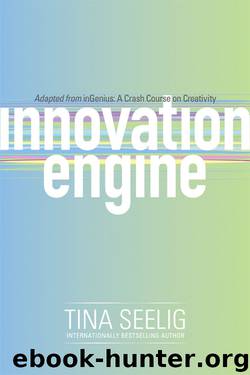Innovation Engine by Tina Seelig

Author:Tina Seelig [Seelig, Tina]
Language: eng
Format: epub
ISBN: 9780062327048
Publisher: HarperCollins
Published: 0101-01-01T00:00:00+00:00
CHAPTER FIVE
RESOURCES
Resources are all the assets in your environment, including people with different skills, natural resources, and financial support. The more knowledge you have, the more resources you can mobilize. For example, the more you know about fishing, the more fish you can catch; the more you know about copper, the more of it you can mine; and the more you know about venture capital, the more likely you are to get funding. Of course, if you live somewhere with a lot of fish, you will likely learn about fishing; if you live somewhere with an abundance of copper, you will probably learn about mining; and if you live in a place with a wealth of venture capitalists, it is much easier to learn about venture funding. As such, the resources in your environment influence your knowledge, and your knowledge allows you to access the resources.
It is important to note that some of the resources in your environment are easy to spot, while others require physical or mental mining. In addition, sometimes the resources at your disposal can be used in surprising and powerful ways.
An extreme example comes from the Apollo 13 disaster in 1970. Teresa Amabile and her colleagues at Harvard University describe this in their paper “Creativity Under the Gun”:14
In 1970, during Apollo 13’s flight to the moon, a crippling explosion occurred on board, damaging the air filtration system and leading to a dangerous buildup of carbon dioxide in the cabin. If the system could not be fixed or replaced, the astronauts would be dead within a few hours. Back at NASA mission control in Houston, virtually all engineers, scientists, and technicians immediately focused their attention on the problem. Working with a set of materials identical to those on board the spacecraft, they desperately tried to build a filtration system that the astronauts might be able to replicate. Every conceivable material was considered, including the cover of the flight procedure manual. With little time to spare, they came up with something that was ugly, inelegant, and far from perfect but that seemed like it just might do the job. The engineers quickly conveyed the design with enough clarity that the cognitively impaired astronauts were, almost unbelievably, able to build the filter. It worked, and three lives were saved.
This remarkable experience demonstrates that limited resources can be deployed with great effect. This idea is reflected in Eric Ries’s work on “lean startups.”15 He developed this approach during his tenure as cofounder and technical lead at IMVU, a successful online gaming company. Through this experience he learned that working with forced constraints leads to better products. The lean start-up philosophy advocates the creation of rapid prototypes of products to test-market assumptions by releasing a “minimum viable product.” By spending the smallest amount of time and money you can on a new product before it is released, you end up with much faster customer feedback. This allows you to develop and improve your products more quickly than if you use traditional engineering practices.
Download
This site does not store any files on its server. We only index and link to content provided by other sites. Please contact the content providers to delete copyright contents if any and email us, we'll remove relevant links or contents immediately.
Rewire Your Anxious Brain by Catherine M. Pittman(18622)
Talking to Strangers by Malcolm Gladwell(13332)
The Art of Thinking Clearly by Rolf Dobelli(10390)
Mindhunter: Inside the FBI's Elite Serial Crime Unit by John E. Douglas & Mark Olshaker(9299)
Becoming Supernatural by Dr. Joe Dispenza(8186)
Change Your Questions, Change Your Life by Marilee Adams(7718)
Nudge - Improving Decisions about Health, Wealth, and Happiness by Thaler Sunstein(7680)
The Road Less Traveled by M. Scott Peck(7574)
The Lost Art of Listening by Michael P. Nichols(7480)
Mastermind: How to Think Like Sherlock Holmes by Maria Konnikova(7304)
Enlightenment Now: The Case for Reason, Science, Humanism, and Progress by Steven Pinker(7289)
Win Bigly by Scott Adams(7172)
The Way of Zen by Alan W. Watts(6578)
Daring Greatly by Brene Brown(6489)
Big Magic: Creative Living Beyond Fear by Elizabeth Gilbert(5727)
Grit by Angela Duckworth(5577)
Ego Is the Enemy by Ryan Holiday(5393)
Men In Love by Nancy Friday(5218)
The Laws of Human Nature by Robert Greene(5138)
